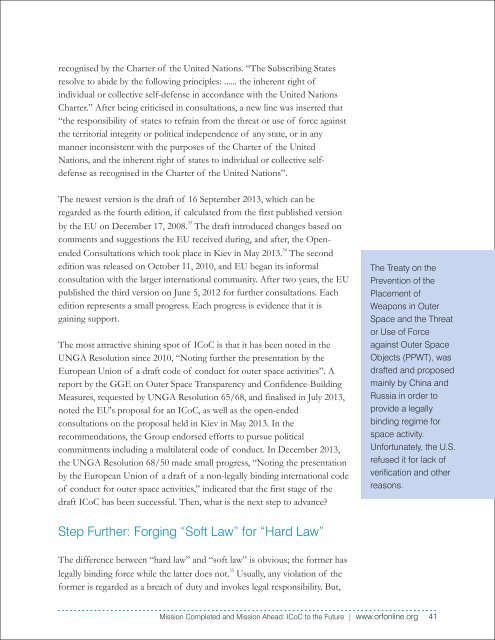AwaitingLaunch_1397728623369
AwaitingLaunch_1397728623369
AwaitingLaunch_1397728623369
You also want an ePaper? Increase the reach of your titles
YUMPU automatically turns print PDFs into web optimized ePapers that Google loves.
ecognised by the Charter of the United Nations. “The Subscribing States<br />
resolve to abide by the following principles: ...... the inherent right of<br />
individual or collective self-defense in accordance with the United Nations<br />
Charter.” After being criticised in consultations, a new line was inserted that<br />
“the responsibility of states to refrain from the threat or use of force against<br />
the territorial integrity or political independence of any state, or in any<br />
manner inconsistent with the purposes of the Charter of the United<br />
Nations, and the inherent right of states to individual or collective selfdefense<br />
as recognised in the Charter of the United Nations”.<br />
The newest version is the draft of 16 September 2013, which can be<br />
regarded as the fourth edition, if calculated from the first published version<br />
33<br />
by the EU on December 17, 2008. The draft introduced changes based on<br />
comments and suggestions the EU received during, and after, the Open-<br />
34<br />
ended Consultations which took place in Kiev in May 2013. The second<br />
edition was released on October 11, 2010, and EU began its informal<br />
consultation with the larger international community. After two years, the EU<br />
published the third version on June 5, 2012 for further consultations. Each<br />
edition represents a small progress. Each progress is evidence that it is<br />
gaining support.<br />
The most attractive shining spot of ICoC is that it has been noted in the<br />
UNGA Resolution since 2010, “Noting further the presentation by the<br />
European Union of a draft code of conduct for outer space activities”. A<br />
report by the GGE on Outer Space Transparency and Confidence-Building<br />
Measures, requested by UNGA Resolution 65/68, and finalised in July 2013,<br />
noted the EU's proposal for an ICoC, as well as the open-ended<br />
consultations on the proposal held in Kiev in May 2013. In the<br />
recommendations, the Group endorsed efforts to pursue political<br />
commitments including a multilateral code of conduct. In December 2013,<br />
the UNGA Resolution 68/50 made small progress, “Noting the presentation<br />
by the European Union of a draft of a non-legally binding international code<br />
of conduct for outer space activities,” indicated that the first stage of the<br />
draft ICoC has been successful. Then, what is the next step to advance?<br />
The Treaty on the<br />
Prevention of the<br />
Placement of<br />
Weapons in Outer<br />
Space and the Threat<br />
or Use of Force<br />
against Outer Space<br />
Objects (PPWT), was<br />
drafted and proposed<br />
mainly by China and<br />
Russia in order to<br />
provide a legally<br />
binding regime for<br />
space activity.<br />
Unfortunately, the U.S.<br />
refused it for lack of<br />
verification and other<br />
reasons.<br />
Step Further: Forging “Soft Law” for “Hard Law”<br />
The difference between “hard law” and “soft law” is obvious; the former has<br />
35<br />
legally binding force while the latter does not. Usually, any violation of the<br />
former is regarded as a breach of duty and invokes legal responsibility. But,<br />
Mission Completed and Mission Ahead: ICoC to the Future | www.orfonline.org 41








